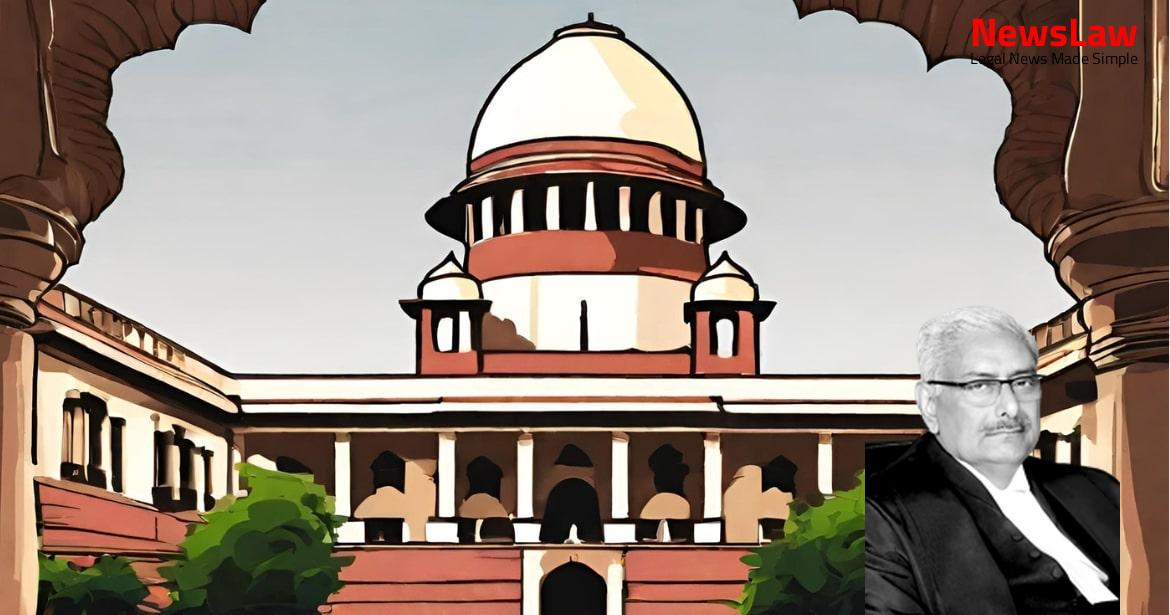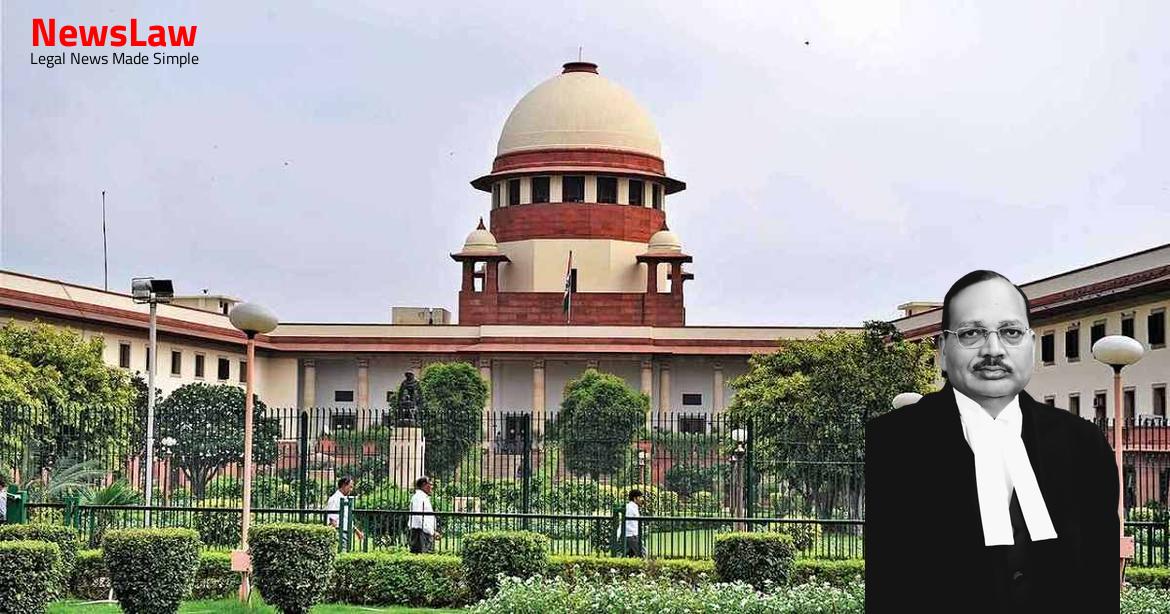Delve into the case of Contai Rahmania High Madrasah challenging the State of West Bengal over regulatory control in minority education institutions. The Supreme Court’s judgement delves into the balance required for academic quality while upholding minority rights. The case touches upon the intricacies of the Commission Act and its impact on teacher appointments in aided madrasahs. Stay tuned to explore the legal nuances surrounding this significant issue.
Facts
- Writ Petition No.20650(W) of 2013 was filed by the Managing Committee of Contai Rahmania High Madrasah challenging the validity of certain sections of the Commission Act.
- The Managing Committee argued that the Commission Act took over the appointment process of teachers in aided Madrasahs recognized as minority institutions, and the recommendations made by the Commission were binding on the Managing Committee.
- Respondent No.1 challenged the Commission Act through a separate Writ Petition No.20650(W) of 2013, claiming that the Act infringed upon the rights of minority institutions to choose their own teachers.
- The Single Judge of the High Court accepted this submission and allowed the Writ Petition.
- Candidates recommended by the Commission for teacher appointments in aided Madrasahs, including the Appellant, appealed the decision through A.S.T. No. 192 of 2014 before the Division Bench.
- Secretary, on behalf of the Contai Rahmania High Madrasah, filed C.A.N. No. 3078 of 2014.
- The West Bengal Madrasah Service Commission issued an advertisement for recruitment to various posts.
- The eligibility criteria specified in the advertisement required the candidates to have qualified the Teachers’ Eligibility Test (TET) conducted by the West Bengal Central School Service Commission.
- The petitioners who did not possess the TET qualification challenged this criteria before the court.
- The Single Judge allowed the petition holding that the TET qualification criteria was arbitrary and discriminatory.
- The State of West Bengal filed an appeal against this decision which was also dismissed by the Division Bench.
Issue
- The issue at hand is to determine the extent to which the State can regulate admissions in unaided educational institutions, both minority and non-minority.
- The specific question is whether the appointment of teachers in an aided institution by the College Service Commission, which restricts the petitioners’ right to appointment, constitutes a reasonable restriction in the interest of the general public.
- The petitioners assert their right to establish and administer educational institutions.
Also Read: CRPF Act: Validity of Rule 27 for Compulsory Retirement – Case of Head Constable vs. CRPF
Arguments
- S.B. Sinha, J. in Islamic Academy compared the situation to a pyramid-like structure and suggested considering the right of minorities in conjunction with fundamental duties.
- Higher educational institutions offering graduate and specialized education are considered a distinct class.
- Under the Commission Act, the Commission selects and recommends teachers and non-teaching staff for Madrasahs, but the appointment is given by the respective institutions, maintaining control of Managing Committees and day-to-day administration.
- There are 614 Madrasahs in the state, mostly located in remote areas, educating around 5,00,000 students following a prescribed syllabus.
- The State aids Managing Committees in hiring qualified teachers to ensure quality education for students.
Also Read: DAMEPL vs. DMRC: Curative Petition and Arbitral Award Restoration
Analysis
- The judgement extensively discusses the extent of regulatory power over aided minority educational institutions.
- It emphasizes the importance of achieving excellence in institutions while also preserving the rights of minorities to establish and administer their educational institutions.
- The statutory provisions under the Commission Act aimed at regulating the appointment of teachers in Madrasahs are analyzed.
- The balance between ensuring academic excellence and protecting the autonomy of minority institutions is a recurring theme.
- The judgement delves into the implications of regulations on the right to administer educational institutions.
- It clarifies the distinction between professional and non-professional educational institutions in terms of regulatory interventions.
- The protection of minority rights under Article 30(1) is reaffirmed, highlighting the delicate balance required in regulatory frameworks.
- Various cases and legal provisions are cited to support the analysis of the extent of regulations applicable to minority educational institutions.
- The Commission Act provisions are evaluated based on the principles laid down in preceding judgements.
- The importance of maintaining transparency, merit-based selection, and quality education in minority institutions receiving aid is underscored.
- Section 51-A of the Act lays down general conditions for dismissal, removal, reduction in rank, and termination of services of staff of colleges.
- The provision of Section 51-A does not unreasonably encroach on the rights of minority institutions protected by Article 30(1) of the Constitution.
- Minority institutions have the freedom to grant admission to students subject to certain clarifications.
- The West Bengal Board of Madrasah Education Act, 1994 established a Board for Madrasah Education in West Bengal.
- Recognized and aided Madrasahs in West Bengal were granted minority educational institution status by the Government.
- The criteria and benefits for declaring recognized Madrasahs as minority institutions were specified in a government notification.
- The Madrasah Service Commission was empowered to recommend the appointment of teachers and non-teaching staff in Madrasahs within its jurisdiction.
- The rules and regulations for the appointment and transfer of teachers in Madrasahs were prescribed by the Commission and approved by the State Government.
- The functions of the Board included granting or withdrawing recognition, setting syllabus and educational standards for Madrasahs, and conducting examinations.
- The West Bengal Minorities Commission Act, 1996 constituted a commission to assess the development and rights of religious and linguistic minorities in West Bengal.
- The provisions of the Commission Act are not violative of the rights of minority educational institutions.
- The composition of the Commission, focusing on individuals with profound knowledge in Islamic Culture and Theology, ensures the special needs of minority educational institutions are considered.
- The present case stands on a different footing due to the unique features mentioned above.
Decision
- The Commission is now able to select and nominate teachers for Madarshas under the Commission Act and its Rules.
- All nominations made by the Commission under the Commission Act are declared valid and operational.
- Appointments made by Madarshas post the High Court disposal will be considered valid.
- Sections 8, 10, 11, and 12 of the Commission Act are held as constitutional.
- No separate orders needed for Writ Petitions and contempt petitions as they are disposed of as per the declaration.
- No costs awarded.
- The appeals are allowed with the above observations.
Case Title: SK. MD. RAFIQUE Vs. MANAGING COMMITTEE, CONTAI RAHAMANIA HIGH MADRASAH AND ORS (2020 INSC 3)
Case Number: C.A. No.-005808-005808 / 2017



